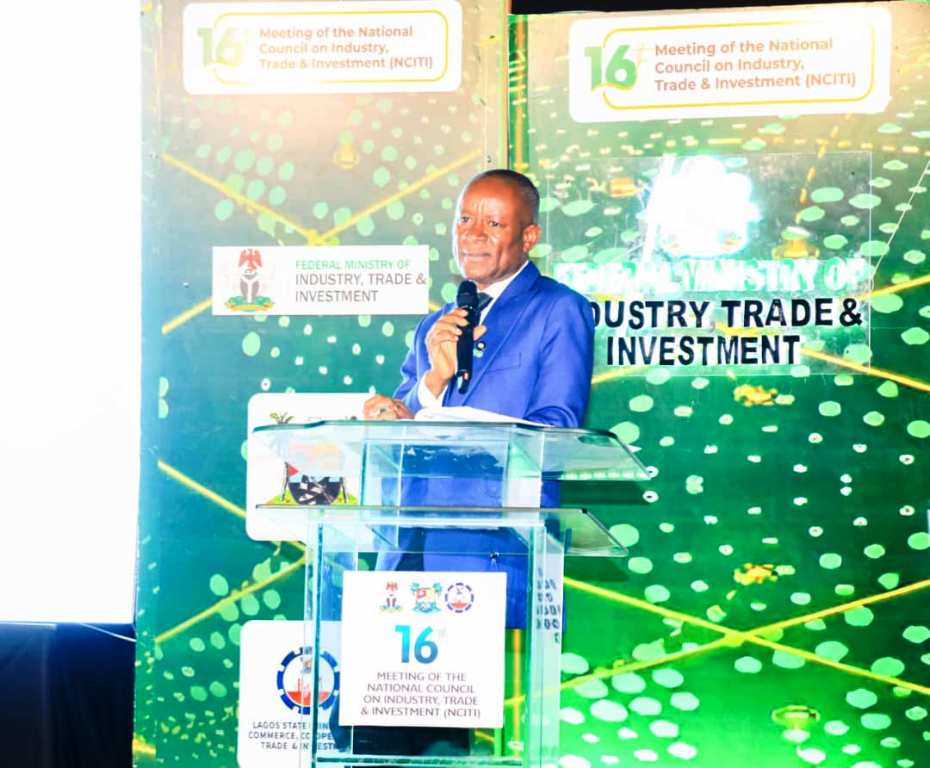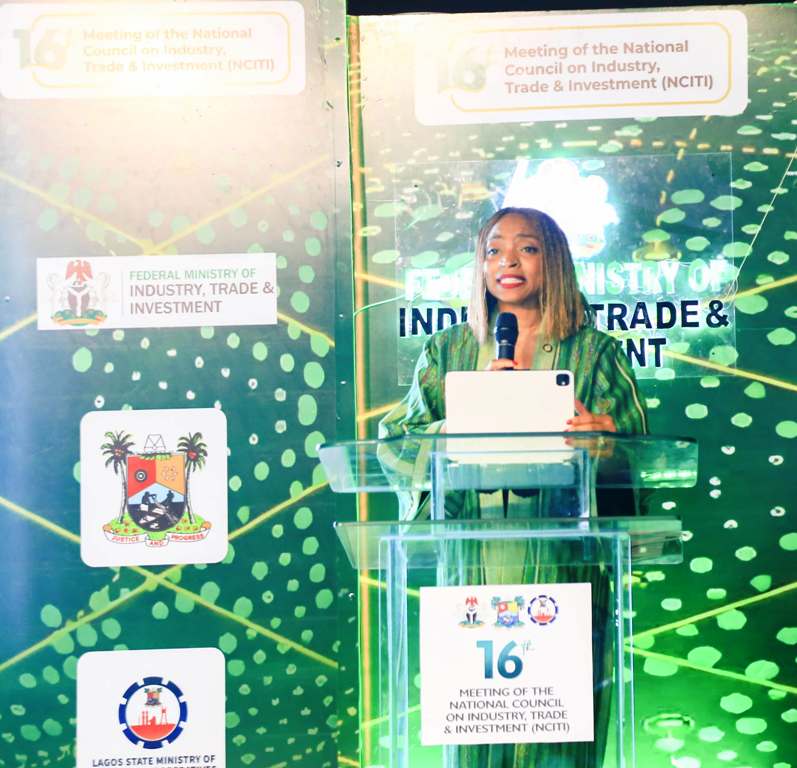
LAGOS, NIGERIA — The 16th Meeting of the National Council on Industry, Trade and Investment, currently ongoing in Lagos, has brought together national and sub-national stakeholders with a shared commitment to reposition Nigeria’s economic landscape through coordinated industrial, trade, and investment strategies.
Presided over by the Honourable Minister of Industry, Trade and Investment, Dr. Jumoke Oduwole, this year’s Council is themed “Accelerating Diversification by Leveraging Industry, Trade and Investment for Shared Prosperity.” In her address during the Executive Session, Dr. Oduwole emphasised the urgency of transforming Nigeria’s mono-product economy through sustainable industrial growth, technological innovation, and inclusive investment policies. She acknowledged the commendable role of Lagos State as a model of enterprise and effective policy execution.
“Our aim is to transition from dependence on a single commodity to building a resilient, productive, and diversified economy,” Dr. Oduwole stated. “This requires coordination at every level — federal, state, and local — to enable industrial clusters, unlock capital for MSMEs, and support technology-driven trade solutions.”
She highlighted the Ministry’s ongoing work reforming investment policies, supporting digital trade under the AfCFTA, and empowering young talent through global linkages. “We must move from resolutions to implementation, from intention to action,” she added.
Also addressing the Council, Minister of State for Industry, Trade and Investment, Senator John Owan Enoh, reiterated the need for tangible outcomes from Council decisions. “This meeting must go beyond rhetoric. Our sector is key to reversing Nigeria’s economic vulnerabilities and must lead the charge in moving from raw materials to finished goods,” he said.
Senator Enoh announced the strategic formation of the Industrial Revolution Work Group (IRWG), co-chaired by the President of the Manufacturers Association of Nigeria (MAN), as a vehicle to dismantle industrial barriers. He further emphasized the importance of private sector partnerships and welcomed the renewed emphasis on executive support through initiatives such as the Nigerian First Policy and the revitalization of the cotton, textile, and garment sector.
The Governor of Lagos State, represented by Dr. Aina Olugbemiga Ayola, lauded the Council’s theme, affirming Lagos State’s readiness to harness its industrial assets in support of the national transformation agenda. The State pledged continuous collaboration to achieve sustainable economic growth.
Delivering a summary of the Council’s technical sessions, the Permanent Secretary of the Federal Ministry of Industry, Trade and Investment, Ambassador Nura Abba Rimi, noted that 75 memoranda were reviewed—31 actionable—across key thematic areas. Presentations and panel discussions covered themes ranging from finance access and digital inclusion to manufacturing cluster development and trade facilitation.
The Council reaffirmed its resolve to drive Nigeria’s diversification agenda through data-driven accountability, policy continuity, and alignment between federal and state ambitions. As deliberations progress, all eyes are now on concrete implementation to stimulate local industries, elevate SMEs, and secure Nigeria’s place as Africa’s next industrial powerhouse.
The Council resolved to prioritise digital transformation as a key enabler for trade and industrial growth. Emphasis was placed on leveraging technology to streamline export processes, build digital trade infrastructure, and enhance stakeholder capacity. To this end, agencies were encouraged to collaborate on implementing digital trade platforms, including single-window systems and e-customs, while also improving broadband infrastructure and data governance to support a modern, tech-driven economy.
Support for MSMEs emerged as a central theme, with strong calls for expanding access to finance, formalisation, and tailored capacity-building programmes. The Council urged the FMITI, in partnership with agencies like NEPC and SMEDAN, to formalise small businesses and promote inclusive finance models targeting women, youth, and persons with disabilities. Blended finance tools and catalytic investment vehicles were also recommended to scale up funding for green enterprises and local manufacturers, especially within industrial clusters and Free Trade Zones (FTZs).
To drive inclusive industrialisation, the Council advocated for strengthened state-federal collaboration in developing Special Economic Zones (SEZs), manufacturing parks, and industrial corridors. It highlighted the critical role of coordinated planning, infrastructure development, and policy alignment in enhancing productivity and job creation. Additionally, the Council adopted a data-driven framework for monitoring industrial performance, called for the protection of intellectual property rights, and emphasised the need for sustained implementation of Ease of Doing Business reforms to unlock Nigeria’s full trade potential under AfCFTA.
Council, in Plenary, considered a total of Seventy-Five (75) Memoranda submitted by various Ministries, Departments, Agencies, and stakeholders across the country on matters related to the Industry, Trade and Investment sector. After extensive brainstorming and deliberations, council noted and resolved as follows:
a) That there is the need to harness technology to overcome the cumbersome processes and manual export documentations, for digital trade facilitation and Ease of Doing Business in Nigeria;
b) That to enable Digital Trade, we must design robust systems, build supporting infrastructure, leverage emerging technologies and encourage digital capacity for stakeholders;
c) The urgent need to deepen support for MSMEs through facilitation of improved access to finance, formalisation strategies, and targeted capacity-building programmes;
d) That the development of industrial clusters, Special Economic Zones (SEZs), and Free Trade Zones remains a priority for attracting private sector investment and promoting national and regional industrialization;
e) That for inclusive economic growth and development, State Ministries of Commerce, Industry and Trade, should be encouraged to prioritize the establishment of industrial clusters and align their industrial development strategies with national priorities for the optimization of manufacturing clusters which is crucial for enhancing industrial development, creating employment opportunities and fostering economic growth;
f) That the use of FTZ in accelerating industrialization for economic diversification and growth has been successful in many part of the world and should be prioritize as a vehicle for export led growth in Nigeria;
g) That it was of utmost necessity and importance to strengthen data governance, competition frameworks, and public-private partnerships to support innovation, enterprise growth, and sub-national industrial policy implementation in Nigeria;
h) Encourage relevant agencies to work together to accelerate the digitalization of trade facilitation processes, including the development of single-window platforms, e-customs, and digital ID systems for businesses;
i) The Federal Ministry of Industry, Trade and Investment (FMITI), in collaboration with the Nigeria Export Promotion Council (NEPC) and SMEDAN, should intensify efforts toward formalizing small businesses through a unified National MSME Business Formalization Programme;
j) That the FMITI should strengthen engagement with financial institutions, development partners and the organized private sector to develop blended finance tools and catalytic investment vehicles tailored to MSMEs and green enterprises;
k) Council underscored the role of infrastructure, planning, and supply chain coordination in enhancing regional industrial capacity;
l) In line with global best practices, Council adopted data-driven approach to monitoring industrial performance through strengthened collaboration between the FMITI, State, MDAs, and research institutions;
m) Nigeria must maximize the opportunities provided by the AfCFTA to trigger industrial growth, increased regional trade and attract investment, by promoting and facilitating the participation of SMEs in Africa regional trade;
n) To take urgent steps and actions to curb the existing infrastructural gaps, insecurity and other social vices to increase productive economic activities, for increased investment, industrial growth and improved trade;
o) The Council highlighted the critical roles of Development Finance Institutions (DFIs), private sector players, and public-private investment partnerships in driving sustainable financing frameworks for SMEs;
p) that the Federal Government should improve digital infrastructure, especially broadband access, to support trade and investment across all regions;
q) that the Federal Government through FMITI should deepen collaboration with State Governments in planning and implementation of MSME programmes to achieve greater impact;
r) that access to finance for MSMEs should be expanded by leveraging Public Private Partnerships (PPPs), digital platforms, and inclusive financing models that cater for women, youth and persons with disabilities;
s) that government should scale up investments in manufacturing clusters and industrial parks, especially in the areas of power, land access, and shared facilities;
t) that SMEDAN should continue its support to MSMEs through programmes like One Local Government One Product (OLOP), interest-free loans, and cluster development mapping;
u) that intellectual property rights for local products (e.g., Adire) should be protected and dumping discouraged through appropriate tariffs; and
v) that government should intensify implementation of the Ease of Doing Business reforms and address logistics challenges affecting intra-African trade.



Approvals of the Council
Based on extensive deliberations on the memoranda presented, the Council considered and approved the following:
a) The establishment of Industrial Property Facilitation Centres at designated Special Economic Zones to improve enterprise registration, intellectual property protection, and investor support services;
b) The implementation of a National Pre-Retirement Business Preparatory Programme to equip retiring public servants with the knowledge and tools to transition into productive entrepreneurship;
c) The development of a harmonised master plan for industrial clusters across the country, to guide infrastructure planning, spatial development, and investment targeting;
d) The upgrade of infrastructure at Bauchi and Port Harcourt Trade Fair Complexes, to improve the competitiveness of local trade exhibitions and promote Made-in-Nigeria products;
e) The establishment of the SMEDAN Mentorship Programme (SMP) which will bridge the gap between MSMEs and experienced entrepreneurs’/industry experts, fostering business growth, job creation, and economic development;
f) the promotion and development of the nation’s cold chain logistics and its entire sector, to minimize wastage of perishables and reshape the country’s food logistics landscape for enhanced non-oil export and economic growth;
g) The Federal Ministry of Industry Trade and Investment adoption and implementation of the proposed export financing strategies to boost export, strengthen trade resilience, unlock new investment opportunities, and foster long-term economic sustainability;
h) The development of technical regulations on compressed natural gas (CNG) dispenser and other measurement devices not yet provided for in the regulations to the weights and measures act (Cap W3 LFN 2004) to promote inclusivity, measurement integrity, consumer protection, and boost confidence in Nigeria’s trade measurement system.
i) That SMEDAN should proceed with the National MSMEs Business Formalization Programme (NMBFP) initiative in order to facilitate the mass formalization of MSMEs in the country for smooth disbursement of incentives and other government support.
j) Policy, infrastructural and funding support and Encouragement of inter-agency cooperation to drive the commodity trading sector for both domestic and international trade, and achieve NCX’s Strategic Execution Plan (SEP)
In Conclusion the Council commended the government and good people of Lagos State for their exceptional hospitality and effective hosting of the 16th NCITI.
Delegates expressed satisfaction with the quality of discussions and acknowledged the leadership of the Honourable Minister and Honourable Minister of State for Industry, Trade and Investment in driving impactful sector-wide reforms. Stakeholders expressed satisfaction with the structured of Council agenda, inclusive engagement, and commitment to implement the actionable outcomes.
The Council recognised the critical role of collaboration among federal, state, and non-state actors in ensuring the success of industrial, trade and investment programmes across Nigeria and acknowledged the input of the private sector and development partners in supporting the Ministry’s objectives.
The meeting was adjourned to a date and venue that will be communicated to members in due course.
Signed
Dr Adebayo Thomas
Director: Press & Public Relations
FMITI
May 21st 2025




